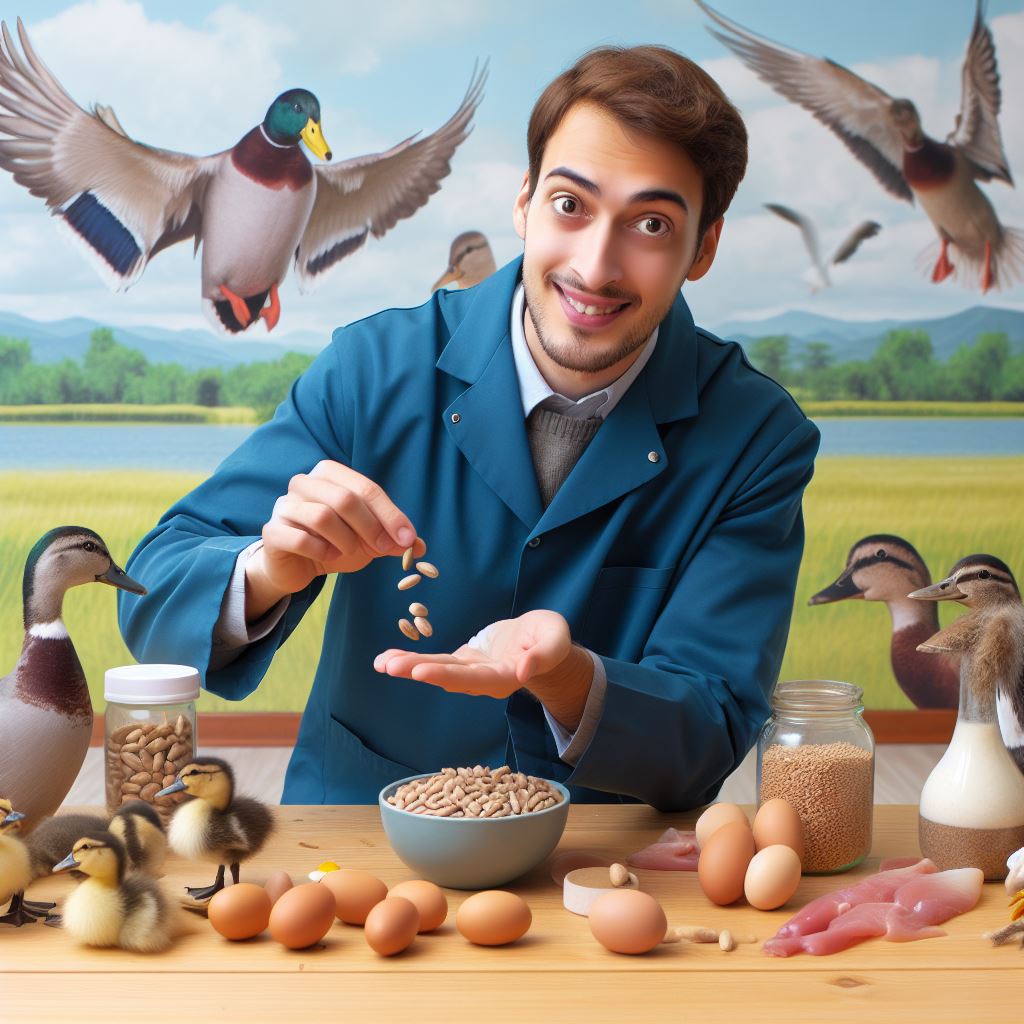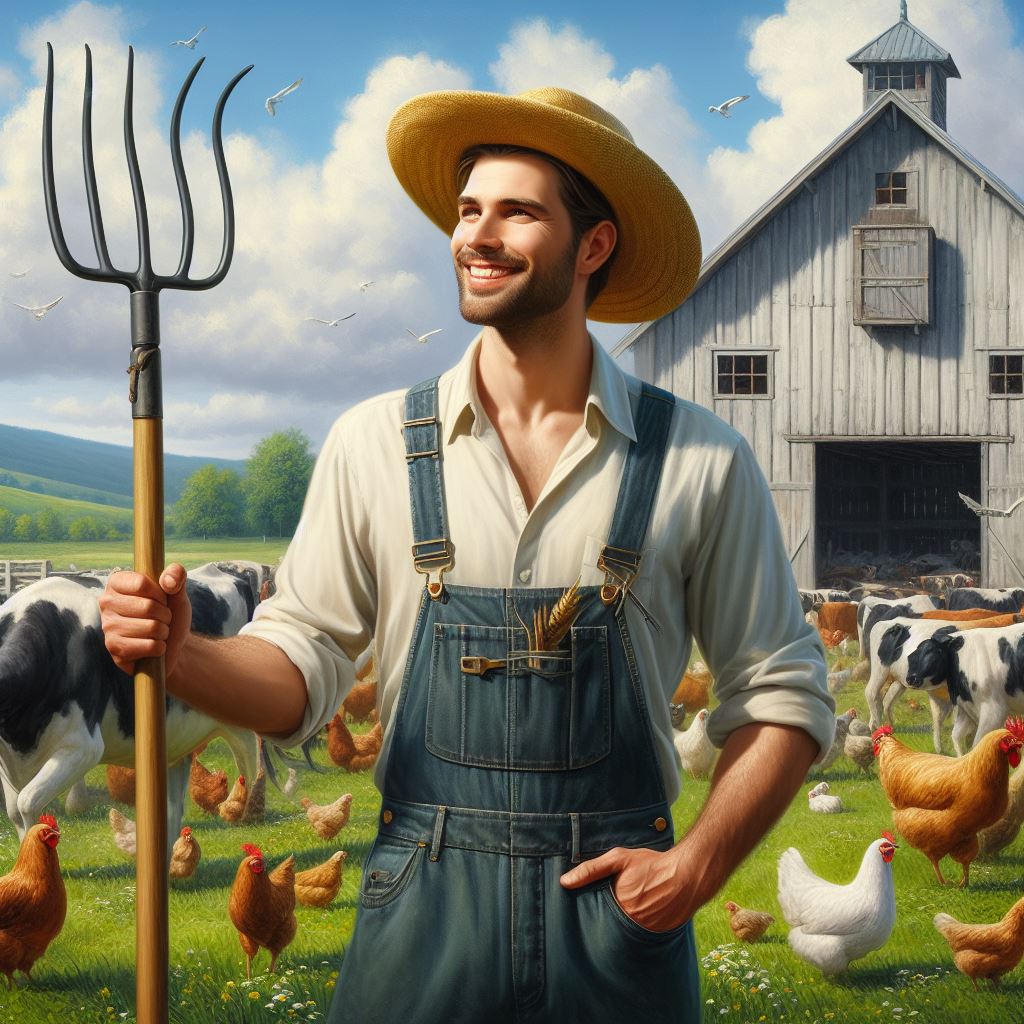Introduction
Let’s Explore Duck Nutrition Guide: Feeding for Healthy Flocks
Duck nutrition plays a crucial role in maintaining healthy flocks.
Feeding ducks a healthy diet is essential for their overall well-being and longevity.
Proper nutrition ensures optimal growth, strong immune systems, and reproductive success among ducks.
Let’s dive into the importance of duck nutrition and how it contributes to the health of duck flocks.
Role of nutrition in maintaining healthy flocks
Nutrition plays a significant role in meeting the ducks’ energy requirements and fulfilling their essential nutrient needs.
A balanced diet must provide adequate protein, carbohydrates, fats, vitamins, and minerals.
Proper nutrition boosts the ducks’ immune system, making them less susceptible to diseases and infections.
It helps develop a robust defense mechanism against various pathogens.
A healthy diet promotes optimal growth and development in ducks, ensuring they reach their genetic potential.
It supports their reproductive capabilities, including egg production and fertility.
Feeding ducks, a well-balanced diet is also crucial for maintaining their feathers and overall appearance.
Proper nutrition contributes to healthy plumage, providing better insulation and waterproofing.
Nutrition is particularly crucial during the breeding season when ducks require additional nutrients for successful mating and egg production.
Feeding ducks, a varied diet is essential to mimic their natural feeding behaviors and ensure a diverse range of nutrients.
Transform Your Agribusiness
Unlock your farm's potential with expert advice tailored to your needs. Get actionable steps that drive real results.
Get StartedA mix of pellets, fresh fruits, vegetables, grains, and insects can be incorporated into their diet.
Therefore, duck nutrition is vital for the well-being and overall health of flocks.
Providing ducks with a healthy diet rich in essential nutrients supports their growth, immune system, reproduction, and overall vitality.
As caretakers, we must prioritize their nutritional needs to ensure healthy and thriving duck populations.
Understanding Ducks’ Nutritional Needs
Ducks have unique nutritional requirements that differ from other poultry.
It is crucial to provide them with a balanced diet to meet their specific needs.
Here is an overview of the essential nutrients needed for their growth, development, and overall health.
Protein
- Ducks require a higher protein intake compared to chickens and turkeys.
- Protein is crucial for muscle development, feather production, and egg formation.
- A diet consisting of 16-18% protein is recommended for ducks of all ages.
Energy
- Ducks need more energy due to their active lifestyle, especially during the breeding season.
- Carbohydrates and fats are excellent sources of energy for them.
- Corn, wheat, and peas are commonly used energy sources in duck feed.
Vitamins
- Ducks need a variety of vitamins to support their growth and overall health.
- Vitamin A is essential for proper feather development and vision.
- Vitamin D aids in calcium absorption for strong bones and helps prevent leg problems.
- B vitamins are necessary for metabolism and overall immune function.
Minerals
- Ducks require a balanced intake of minerals to maintain good health.
- Calcium is critical for producing strong eggshells and preventing egg-related issues.
- Phosphorus is necessary for bone development and energy metabolism.
- Sodium and potassium help maintain electrolyte balance and normal bodily functions.
Fiber
- Ducks need some fiber in their diet to aid in digestion.
- Including fresh greens and vegetables can provide the necessary fiber content.
- Avoid excessive amounts of fiber, as it may reduce their ability to digest other nutrients.
Essential Fatty Acids
- Ducks require essential fatty acids, such as omega-3 and omega-6, for proper growth and development.
- These fatty acids are vital for brain function, immune response, and promoting healthy feathers.
- Including fish meal, flaxseed, or soybean oil in their diet can meet their fatty acid requirements.
Water
- Ducks have higher water needs compared to other poultry.
- They need access to clean, fresh water at all times.
- Water is not only essential for hydration but also aids in digestion and overall health.
Providing ducks with a well-balanced diet is crucial for their optimal growth, development, and overall health.
It is recommended to use commercially available duck feed that is specifically formulated to meet their nutritional needs.
Supplementing their diet with fresh greens, vegetables, and small amounts of protein-rich treats can also be beneficial.
Regularly monitor their body condition and adjust their feed accordingly.
Remember to always provide clean water, as it is a vital component of their diet.
By understanding and meeting their unique nutritional requirements, you can ensure a healthy and thriving flock of ducks.
Read: Alpaca Feed Tips: Nutrition for Fleece Quality
Feeding Ducks a Balanced Diet
When it comes to feeding ducks, providing a balanced diet is crucial for ensuring healthy flocks.
Ducks, like any other living creatures, require a variety of nutrients to thrive.
Let’s discuss the main components of a balanced diet for ducks and provide examples of suitable food sources for each nutrient category.
Protein
- Ducks need protein for growth, feather development, and egg production.
- Good sources of protein for ducks include insects, snails, earthworms, and certain types of fish.
- You can also offer them high-quality commercial duck feeds that contain sufficient protein levels.
Carbohydrates
- Carbohydrates provide ducks with energy for their daily activities.
- Some suitable carbohydrate sources for ducks include grains like corn, wheat, barley, and oats.
- Vegetables and fruits such as lettuce, peas, carrots, and apples are also great carbohydrate options.
Fats
- Fats are essential for ducks as they help insulate and protect their bodies, providing warmth.
- Nutritious vegetable oils like corn oil and soybean oil can be added to their diet.
- Avoid excessive fat intake, as it can lead to obesity and related health issues.
Vitamins
- Ducks require a range of vitamins for healthy growth and proper functioning of their bodies.
- Leafy greens like spinach and kale are excellent sources of vitamins A, C, and K.
- Fruits such as oranges, strawberries, and blueberries provide beneficial vitamins as well.
Minerals
- Minerals play important roles in maintaining the overall health and well-being of ducks.
- Calcium is necessary for strong eggshells, so offering crushed oyster shells is recommended.
- Other minerals can be obtained from various vegetables, fruits, and commercial duck feeds.
While it’s crucial to provide ducks with the right nutrients, it’s equally important to offer a diverse diet.
A diverse diet ensures that ducks receive all the necessary nutrients in appropriate amounts.
Providing the same food day after day can lead to imbalances and deficiencies.
Introduce different types of food gradually, allowing ducks to adjust and discover new flavors.
Adding variety to their diet can be as simple as offering different types of grains and vegetables or incorporating occasional treats like mealworms or duckweed.
Remember, ducks also need access to clean and fresh water at all times.
Water is essential for digestion, temperature regulation, and overall health.
Showcase Your Farming Business
Publish your professional farming services profile on our blog for a one-time fee of $200 and reach a dedicated audience of farmers and agribusiness owners.
Publish Your ProfileEssentially feeding ducks a balanced diet is crucial for their health and well-being.
Ensure they receive adequate amounts of protein, carbohydrates, fats, vitamins, and minerals.
Offer diverse food sources to meet all their nutritional needs and provide clean water for hydration.
With the right diet, ducks can lead happy and thriving lives.
Read: Nutritional Needs of Turkeys: A Complete Guide

Key Factors in Duck Feeding
The importance of age-based feeding strategies for ducks
- Age-based feeding is crucial as the nutritional requirements of ducks vary at different stages.
- Ducklings require a starter feed high in protein to support their rapid growth.
- Young ducks need a grower feed that balances protein, energy, and minerals to support feather development.
- Adult ducks need a maintenance feed that provides essential nutrients for optimal health and productivity.
The nutritional requirements vary throughout different stages of a duck’s life cycle
- Ducklings have higher protein needs, around 20-22%, to support muscle and organ development.
- As ducks grow, their protein requirements decrease slightly, while energy requirements increase.
- Calcium and phosphorus become essential during the laying phase to support eggshell formation.
- During molting, ducks require additional protein and nutrients to support feather regrowth.
Significance of adjusting diets based on the purpose of raising ducks (meat production, egg-laying, show ducks, etc.)
- Ducks raised for meat production require a high-energy diet with a balance of protein, carbohydrates, and fats.
- Egg-laying ducks need a diet rich in calcium and other minerals to support egg production and shell quality.
- Show ducks require a carefully balanced diet to enhance their feather quality and overall appearance.
- Balancing a diet according to the purpose of raising ducks helps optimize their growth, productivity, and overall health.
Most importantly, feeding ducks in accordance with their specific needs is imperative for their well-being and productivity.
Age-based feeding strategies ensure that ducks receive the appropriate nutrients at each stage of their life cycle.
Ducklings, young ducks, and adult ducks have different nutritional requirements, adjusting their diets accordingly.
Moreover, considering the purpose of raising ducks, whether for meat production, egg-laying, or show purposes, allows for tailored feeding regimes.
By understanding and implementing these key factors in duck feeding, breeders and farmers can maintain healthy flocks and achieve desired outcomes.
Read: Llama Feeding Basics: Health & Nutrition Tips
Common Nutritional Deficiencies in Ducks
Potential Consequences of Inadequate Nutrition in Ducks
- Poor growth and development, leading to stunted ducks with weaker immune systems.
- Reduced egg production and poor egg quality, resulting in lower hatchability rates.
- Increased susceptibility to diseases and infections due to compromised immune function.
- Weakened skeletal system, leading to leg deformities and mobility issues.
- Decreased reproductive performance, including reduced fertility and impaired mating behavior.
Common Signs of Nutritional Deficiencies and Their Associated Health Issues
- Feather abnormalities such as dull, brittle, or excessively shedding feathers indicate protein deficiency.
- Slow growth decreased weight gain, and skeletal deformities can be signs of a calcium or vitamin D deficiency.
- Weakness, lethargy, and a reduced appetite may indicate a deficiency in essential vitamins and minerals.
- Poor eggshell quality, thin-shelled and soft eggs, is often caused by calcium, phosphorus, or vitamin D deficiencies.
- Eye and vision problems, including blindness, can result from a deficiency in vitamin A or other antioxidants.
Recommendations for Preventing and Addressing Nutritional Deficiencies
- Provide a balanced commercial duck feed that meets the specific nutritional requirements of ducks at different life stages.
- Supplement the diet with fresh greens, vegetables, and fruits to ensure a varied and nutrient-rich diet.
- Offer calcium sources such as crushed oyster shells or limestone grit to promote strong skeletal development and eggshell quality.
- Ensure ducks have access to clean and fresh water at all times, as water is essential for digestion and nutrient absorption.
- Consult a veterinarian or avian nutritionist for guidance on dietary supplementation or fortification based on specific deficiencies.
- Regularly monitor the overall health and growth of ducks, and promptly address any signs of nutritional deficiencies or health issues.
- Implement good hygiene practices, such as clean housing and regular cleaning of feed and water containers to prevent bacterial and fungal contamination.
- Avoid overfeeding, as it can lead to obesity and other health problems; provide the appropriate amount of feed based on the ducks’ size and activity level.
- Conduct routine fecal examinations to assess the effectiveness of the feeding program and ensure the absence of internal parasites.
- Educate yourself about the nutritional needs of ducks by reading reliable sources and consulting experts in the field of avian nutrition.
By understanding the potential consequences of inadequate nutrition, recognizing common signs of deficiencies, and implementing preventive measures and proper nutrition management, duck owners can ensure the health and well-being of their flocks for optimal growth, reproduction, and overall vitality.
Read: Buffalo Feeding Guide for Better Meat Quality
Supplements and Treats
Supplements play a crucial role in ensuring that ducks receive all the necessary nutrients for their overall health and wellness.
Ducks, like any other animals, require a balanced diet to thrive and maintain optimal well-being.
Guidance on selecting and incorporating supplements into their diet
When it comes to supplements, selecting the right ones is essential.
It is important to choose supplements that are specifically formulated for ducks, as each species has its own unique nutritional requirements.
Consult a veterinarian or avian nutrition expert for guidance on selecting the appropriate supplements.
Incorporating supplements into a duck’s diet can be done in various ways.
One method is to mix the supplement with their regular feed.
This allows them to consume the necessary nutrients without having to alter their feeding routine drastically.
Another option is to offer the supplement separately, either as a pellet or in a powdered form.
Introducing supplements gradually is recommended to give the ducks’ digestive system time to adjust.
Start by adding small amounts and gradually increase the quantity over a period of time.
This slow transition helps prevent digestive upset and ensures optimal absorption of nutrients.
While supplements are beneficial for maintaining a duck’s nutritional balance, it is crucial to use them in moderation.
Over-supplementation can lead to an imbalance of nutrients, which can have adverse effects on their health.
Always follow the recommended dosage provided by the supplement manufacturer or a professional.
The use of treats as a supplement and the importance of moderation
In addition to supplements, treats can also play a role in a duck’s diet.
Treats can add variety and enrichment to their daily feeding routine.
However, it’s important to remember that treats should be used sparingly and should never replace their primary diet.
Not all treats are suitable for ducks.
Some common treats such as bread or crackers, although enjoyed by ducks, are nutritionally poor and can cause health issues if consumed in excess.
It is best to offer treats that are specifically formulated for ducks, such as mealworms, seeds, or small pieces of fruits or vegetables.
When offering treats, moderation is key.
Treats should only make up a small portion of their overall diet, typically no more than 10% of their daily intake.
Excessive treat consumption can lead to nutritional imbalances and obesity, both of which can have detrimental effects on a duck’s health.
Supplements and treats can add value to a duck’s diet when used appropriately and in moderation.
They can help ensure that ducks receive all the necessary nutrients for their overall well-being.
However, it is important to consult with an expert and follow their guidance to provide the best possible care for your ducks.
Showcase Your Farming Business
Publish your professional farming services profile on our blog for a one-time fee of $200 and reach a dedicated audience of farmers and agribusiness owners.
Publish Your ProfileFeeding Ducks for Optimal Health
Ducks are delightful creatures that require proper nutrition to maintain optimal health and well-being.
In this blog post, we will summarize key points discussed regarding duck nutrition and emphasize the importance of maintaining a healthy diet for ducks.
Additionally, we will provide additional resources for further information on duck nutrition.
Importance of maintaining a healthy diet for ducks to support their overall well-being
- Offer a Balanced Diet: Ducks need a balanced diet consisting of carbohydrates, protein, fats, vitamins, and minerals. Providing a variety of food options is crucial to meet their nutritional needs.
- Importance of Good Quality Feed: High-quality duck feed or pellets should be the foundation of their diet. It is specifically formulated to provide essential nutrients and avoid deficiencies.
- Avoid Overfeeding: While it may be tempting to offer extra treats, overfeeding can lead to obesity and health problems. Follow recommended feeding guidelines to ensure their diet is balanced.
- The Role of Carbohydrates: Ducks require carbohydrates for energy. Include grains, such as corn or wheat, in their diet to provide this essential energy source.
- Essential Protein: Adequate protein is crucial for duck growth, feather development, and egg production. Feed options rich in protein, such as poultry feed or insects, should be included in their diet.
- Healthy Fats: Fats are essential for maintaining healthy ducks, especially during colder weather. Incorporate sources of healthy fats, like fish oil or sunflower seeds, into their diet.
- Importance of Vitamins and Minerals: Ducks need vitamins and minerals for proper growth, strong bones, and a robust immune system. Offer a balanced diet including fresh greens, vegetables, and mineral supplements if necessary.
- Provide Fresh Water: Ducks require access to clean, fresh water at all times. Water aids digestion and keeps ducks hydrated, leading to overall better health.
- Seek Professional Advice: If you have specific concerns about your ducks’ diet or health, consult a veterinarian or avian specialist for expert guidance.
Additional Resources
“Duck Nutrition: How to Feed Ducks” – An informative guide on feeding ducks, including recommended diets and nutrition tips.
“Feeding Ducks 101” – A comprehensive resource covering various aspects of duck nutrition, from appropriate food choices to feeding schedules.
By maintaining a healthy diet for your ducks, you promote their overall well-being and longevity.
Remember to offer a balanced diet, provide fresh water, and avoid overfeeding.
By following these guidelines, you can ensure that your ducks thrive and live healthy, happy lives.
Conclusion
Feeding ducks a nutritious diet is paramount in ensuring their health and the well-being of the entire flock.
By understanding and meeting their nutritional needs, you can promote healthy growth and development in ducks.
Take proactive steps in researching and learning about the appropriate food choices and feeding practices for ducks.
By doing so, you can contribute to the vitality and longevity of your ducks.
Providing a balanced diet ensures that they receive essential vitamins, minerals, and nutrients necessary for their overall well-being.
Remember, a healthy flock is a happy flock.
By consistently providing high-quality feed, you can prevent malnutrition, diseases, and other health issues that can adversely affect your ducks.
Take the time to assess their nutritional requirements and provide a variety of feed options to cater to their specific needs.
Always monitor the quantity of feed given to your ducks and avoid overfeeding.
Maintaining an appropriate feed-to-activity ratio is essential for their overall health.
A healthy duck is not only a pleasure to observe but also a strong and resilient member of the flock.
Your dedication to their nutrition will be rewarded with vibrant plumage, robust immune systems, and a thriving flock dynamic.
Remember, a well-fed duck is a happy duck, and a healthy flock is a happy flock!




